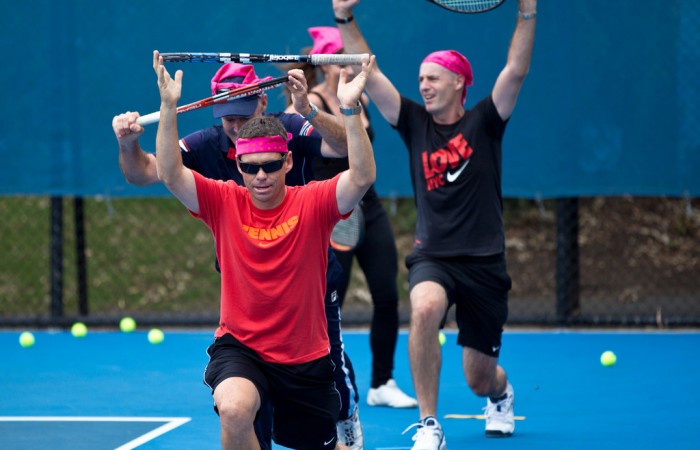Cardio Tennis beneficial for heart health
Exercise programs such as Cardio Tennis can lead to an increase in life expectancy, according to leading cardiologists.
Melbourne, Australia, 7 May 2012 | Tennis Australia

Exercise programs such as Cardio Tennis can lead to an increase in life expectancy, according to leading cardiologists.
Professor Garry Jennings, a cardiologist and director of the Baker IDI Heart and Diabetes Institute, says that if we had a pill that did everything exercise did for cardiovascular health, it would be a highly valuable commodity.
“It has been shown that people who exercise regularly live longer, and have less instance of stroke and cardiovascular disease,” he said.
“We see benefits (in people including) lower blood pressure, a better blood fat profile, lesser likelihood of developing diabetes, and lower blood glucose. So there are all sorts of physiological benefits.”
It’s great news for those who want to get fit in a fun and social environment – core principles of Cardio Tennis – and all the more reason to check out the high-energy, calorie and fat-burning workout, which will be showcased as part of National Heart Week on 6-12 May.
The public is invited to come and join in the fun at Cardio Tennis demonstrations at Circular Quay in Sydney on 9 May and on 10 May at Melbourne’s City Square, with the chance to win a Suunto Heart Rate monitor and register for a free Cardio Tennis workout in their local area.
Sports stars and media personalities will be among the faces hitting the courts in Sydney and Melbourne.
While the cardiovascular benefits of physical activity have long been recognised, intense exercise programs such as Cardio Tennis can have wider-reaching health benefits for a healthy heart.
A typical Cardio Tennis session lasts for 60 minutes, with participants using a heart-rate monitor to guide them towards working consistently at 70-90 per cent of their maximum heart rate.
By being constantly on their toes, put through a variety of drill-based and play-based activities and working out to high-energy music, the results can be impressive for participants – women can burn over 2000 kilojoules in a single session while men can burn over 3000.
Professor Jennings says that the good news is that any form of physical activity is better for cardiovascular health compared to none at all.
“You get benefits that come through (even from) quite light exercise programs … (but) not surprisingly, the more you do in terms of the frequency and intensity of physical activity, the greater the benefit,” he explained.
“We (even) see quite good benefits from exercise programs at about 50-60 per cent max heart rate. There is an incremental benefit if you go to higher levels, but essentially it’s a matter of tailoring the program to the capabilities of the individual.”
Cardio Tennis sessions can be successfully tailored to cater for the various fitness and ability levels of participants.
The use of heart rate monitors allows them to track how hard they’re working, and communicate with their Cardio Tennis coach whether they need to be pushed harder or have the intensity of their workout decreased.
To find out more about the Cardio Tennis program and to find your nearest coach, visit www.cardiotennis.com.au.